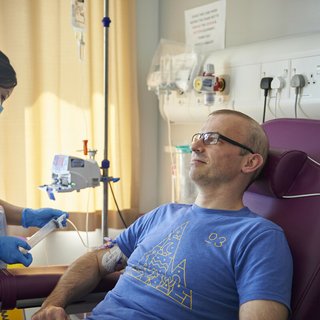Scotland’s drug regulators follow England to approve new blood cancer drugs on NHS
United Kingdom
Regulators in Scotland, the Scottish Medicines Consortium (SMC), have approved two new blood cancer treatments for use on the NHS in Scotland. On behalf of the blood cancer community, we worked with the SMC to champion the needs of patients, which helped them reach this decision.
A CAR-T therapy for lymphoma
Axicabtagene ciloleucel otherwise known as axi-cel (Yescarta) is a CAR-T therapy for adults diagnosed with diffuse large B-cell lymphoma (DLBCL) and high-grade B-cell lymphoma (HGBL).
DLBCL is an aggressive type of non-Hodgkin lymphoma, which is traditionally treated with a stem-cell transplant. Around 5,500 people are diagnosed with DLBCL in the UK each year, with roughly 450 of these cases found in Scotland.
The approval of Yescarta means more patients in Scotland can be treated with CAR-T therapy sooner - giving people like me a better chance of finding a cure and living a more normal life
- Kirsty Stewart
Kirsty Stewart, who is 31 from Aberdeen and is living with DLBCL, said:
“Living with DLBCL is hugely challenging, but today's announcement offers fresh hope to more people with this type of blood cancer in Scotland. As a result of my DLBCL, I have to cope with constant fatigue, fear of relapse and the harsh side effects of existing treatments. The approval of Yescarta means more patients in Scotland can be treated with CAR-T therapy sooner - giving people like me a better chance of finding a cure and living a more normal life".
The SMC did not recommend axi-cel treatment for second-line use back in March 2024 due to ‘cost effectiveness’. However, after a resubmission from Gilead, the pharmaceutical company behind the drug, it’s now been approved for second-line use in Scotland. This means it will be available for people whose cancer has come back within a year of receiving their first-line treatment, or whose cancer doesn’t respond to a first-line treatment.
Josh Hill, Blood Cancer UK’s Scottish Policy Officer, said:
“Blood cancer survival rates in the UK lag behind countries of similar wealth and health and the blood cancer community deserves better, which is why we worked with the SMC on behalf of people affected by blood cancer. It’s great that people in Scotland with DLBCL and HGBL will now have access to the drug axi-cel (Yescarta) on the NHS, where it is already available in England and Wales. CAR-T therapies offer hope to people who are often living with the most aggressive forms of blood cancer. Having earlier access to this innovative drug across the UK is an important step in making sure no one dies from blood cancer or its treatments.”
Drug for aggressive leukaemia approved
Daiichi Sankyo’s drug, quizartinib (Vanflyta) has also been recommended by the SMC for acute myeloid leukaemia. It has been approved for the treatment of newly diagnosed (FLT3-ITD-positive) acute myeloid leukaemia on the NHS in Scotland.
Acute myeloid leukaemia is a fast-growing type of blood cancer that usually needs urgent treatment. The drug, which is a tyrosine kinase inhibitor, is to be used in combination with standard cytarabine and anthracycline induction, and standard cytarabine consolidation chemotherapy.
This new drug is massive news because not only does it give people a potential new road to recovery, it gives people hope and in those moments that means everything.”
- Aileen Lamb
In Scotland, around 150 people were diagnosed with AML per year, and FLT3-ITD mutations are detected in approximately 25% of cases. Despite this, before this announcement, there was no treatments in Scotland which targeted the ITD mutation.
Josh Hill, at Blood Cancer UK, said:
“For people with acute myeloid leukaemia with the FLT3-ITD mutation, the latest research shows the drug gives people a better chance of their cancer going into remission, can extend people’s life, and can also be used after a stem cell transplant, unlike current treatments. However, the chances of survival from acute myeloid leukaemia across the UK remains poor and this drug cannot be used for everyone with the condition, so we must ensure that no stone is left unturned in the hunt for new treatments.”
Aileen Lamb, from Edinburgh who had acute myeloid leukaemia (not the FLT3-ITD mutation) and is now cured said:
“You can’t underestimate the psychological impact of receiving a life-changing blood cancer diagnosis, particularly a hard-to-treat blood cancer like acute myeloid leukaemia. In a moment, the ability to plan for the future is taken away from you, and you have to face up to your own mortality and even when you’re in remission you live in fear of the cancer coming back. This new drug is massive news because not only does it give people a potential new road to recovery, it gives people hope and in those moments that means everything.”

